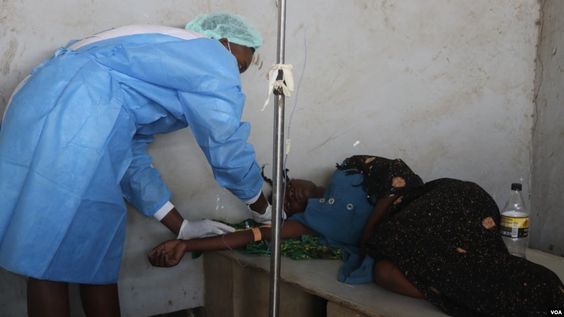Africa
Aid workers report “alarming” rise in cholera cases in camps in the Democratic Republic of Congo

Due to an alarming increase in cholera cases in improvised camps for the displaced, aid workers in the eastern Democratic Republic of the Congo on Thursday issued a warning about a potential “health calamity.”
MSF, the French abbreviation for Doctors Without Borders, reported that 256 patients had been hospitalized to their cholera treatment facility in Munigi, close to the eastern city of Goma, between November 26 and December 7.
The relief organization said that a third of them were young youngsters.
The number of persons suspected of having cholera has dramatically tripled in just 10 days, according to a statement from MSF.
After fleeing the M23 rebel group’s recent offensive, more than 177,000 civilians were “now stuck in dreadful conditions” in the Nyiragongo region to the north of the city.
And during the rainy season, these displaced people were compelled to live in makeshift shelters constructed solely out of branches and tarps.
The mother of an eight-year-old girl with cholera symptoms, Nyira Safari, told MSF, “We have neither baths nor toilets.
She brought her kid, who was “extremely frail and could barely stand,” to a medical facility that was supported by MSF.
Aid response is insufficient
There are tens of thousands of people living in close quarters without access to sanitary facilities.
Simplice Ngar-One, leader of MSF’s cholera response in Goma, said: “Given the shortage of food, housing, latrines, and showers, all the components are there for a health disaster.”
The current humanitarian response, Ngar-One declared, “is far from adequate despite our repeated calls.” These folks are only a few kilometers from Goma, which is the location of several humanitarian groups, so it is simply not reasonable.
The M23, a predominantly Congolese Tutsi militia, started fighting again in late 2021 after going years without engaging in hostilities. Since then, it has conquered large areas of land north of Goma.
Rwanda is allegedly supplying support to the M23, according to Kinshasa, which the U.N. In recent months, experts and U.S. officials have also mentioned it.
However, Kigali has charged the DRC with working with the FDLR, a former Rwandan Hutu rebel organization that was founded in the DRC following the 1994 murder of the Tutsi community in Rwanda.
